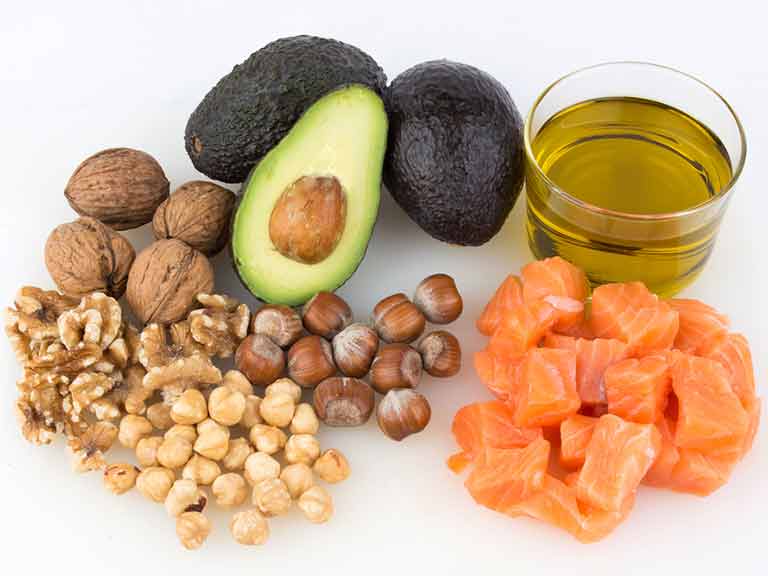Do you have high levels of low-density lipoprotein (LDL) cholesterol? Find out which foods help you boost levels of high-density lipoprotein cholesterol?

Olive oil, oily fish, nuts and avocado are all helpful foods
LDL cholesterol should be 3mmol/L or less for healthy adults as per the official NHS advice, but the ratio of LDL to high-density lipoprotein (HDL) cholesterol – the good stuff that helps keep the arteries clear – is just as important. A ratio higher than four increases the risk of heart disease.
You can reduce levels of LDL cholesterol in your body by stopping smoking, exercising regularly and adopting a healthy, balanced diet, which is low in saturated fat and packed with LDL cholesterol-lowering staples. Making specific dietary changes can help lower your cholesterol and reduce the risk of cardiovascular disease.
But it’s also a good idea to stock up on superfoods that increase good cholesterol to help regulate your LDL/HDL ratio. Many of these foods play a key role in lowering cholesterol as part of a heart-healthy lifestyle. Here are 10 of the best HDL cholesterol-boosters to add to your shopping trolley.
Introduction to Cholesterol
Cholesterol plays a crucial role in your body, but when levels get too high, it becomes a major risk factor for heart disease. High cholesterol, particularly when driven by elevated low density lipoprotein (LDL) cholesterol—often called “bad cholesterol”—can lead to fatty deposits and plaque buildup in your arteries. This buildup narrows blood vessels and increases the risk of heart disease and heart attack. On the other hand, high density lipoprotein (HDL) cholesterol, known as “good cholesterol,” helps remove excess cholesterol from your bloodstream, lowering your risk of heart disease. Maintaining healthy cholesterol levels is all about balance: lowering LDL cholesterol while boosting HDL cholesterol. Adopting a balanced diet that includes foods proven to lower LDL cholesterol and raise HDL cholesterol is one of the most effective ways to protect your heart and reduce your risk of heart disease.
Olive oil and healthy unsaturated fats
Replacing artery-clogging saturated fats in your diet like butter and lard with healthier unsaturated fats, particularly healthy unsaturated fats, is the way forward. Polyunsaturates (polyunsaturated fats), which include sunflower oil, are a type of healthy fat that can help lower LDL cholesterol and support heart health, while monounsaturated fats such as olive oil are best – a recent study found that extra-virgin olive oil doesn’t just increase HDL levels, it improves HDL function, too.
Rapeseed oil
If olive oil isn’t to your taste, opt for rapeseed instead. This heart-healthy oil, which is loaded with monounsaturates, contains the least saturated fat of all the oils (all oils contain saturated fat to varying degrees). Adding to its appeal, rapeseed oil has a distinct advantage over olive oil – a higher smoke point. This makes it more suitable for cooking at high temperatures.
Unlike rapeseed oil, palm oil is high in saturated fats and should be limited to help maintain healthy cholesterol levels.
Groundnut oil
Groundnut or peanut oil is another monounsaturated oil that can help elevate levels of HDL cholesterol in the body, and like rapeseed, groundnut oil is suitable for higher temperature cooking. Just don’t go overboard. All dietary fats, whether they’re saturated or not, are packed with calories and should be used sparingly, especially if you’re trying to lose weight.
The Impact of Saturated Fat
Saturated fat is a type of fat commonly found in foods like red meat, full-fat dairy products, and many processed foods. Consuming too much saturated fat can raise your LDL cholesterol levels, which in turn increases your risk of heart disease and high blood pressure. Foods high in saturated fat not only contribute to weight gain but also make it harder to maintain healthy cholesterol levels. Health experts recommend limiting your intake of saturated fat to less than 5% of your daily calories. Instead, opt for healthy unsaturated fats—such as those found in olive oil, canola oil, and nuts—which can help lower LDL cholesterol and support heart health. Swapping out foods high in saturated fat for those rich in unsaturated fats is a simple yet powerful step toward lowering your risk of heart disease and keeping your cholesterol in check.
Oily fish and heart disease prevention
Oily fish contain omega-3 fatty acids which can raise HDL and lower levels of LDL cholesterol according to Heart UK. Aim for two to three portions a week if you can, and even better, swap a couple of your red meat -based meals with salmon, mackerel or sardines to reduce your saturated fat intake on top of boosting the omega-3s in your diet. Additionally, omega-3 fatty acids found in oily fish are beneficial for lowering blood pressure, further supporting cardiovascular health.
Including oily fish in your diet can help reduce inflammation and support your efforts to stay healthy.
Walnuts
Walnuts are rich in monounsaturates and polyunsaturates, plus they contain decent levels of omega-3 fatty acids, so it comes as no surprise that a study published last year found that participants who ate a handful of walnuts a day had significantly lower LDL readings and higher levels of HDL cholesterol. Regular walnut consumption has also been shown to improve blood cholesterol levels.
Incorporating walnuts into your diet can also contribute to maintaining a healthy weight, thanks to their nutrient density and ability to promote satiety.
Almonds
Walnut aren’t the only nuts that boast HDL cholesterol-boosting powers. Like other tree nuts, almonds are jam-packed with heart-healthy fats that help raise HDL levels in the body. In fact, a trial conducted in 2015 reported that participants who ate a small portion of unsalted almonds every day had increased the levels of HDL cholesterol in their body by 14% after just six weeks. Almonds may also contribute to lowering total cholesterol as part of a heart-healthy diet.
Avocados
Avocados are proven to lower cholesterol, specifically by reducing LDL cholesterol and raising levels of the good HDL cholesterol. The trendy salad favourite is packed with soluble fibre and plant sterols, substances known to block the absorption of cholesterol and effectively lower cholesterol over time. Sterols and stanols, which are naturally present in plant-based foods like avocados, help block cholesterol absorption and support heart health. These components, along with monounsaturated fat, contribute to reducing the amount of LDL cholesterol in the body and boosting HDL cholesterol as part of a healthy, balanced diet.
Kidney beans to lower cholesterol
Next time you rustle up a chilli con carne, you can improve your LDL/HDL ratio by increasing the ratio of kidney beans to saturated fat-heavy beef mince. Kidney beans are bursting with antioxidants and research published last year has linked diets high in antioxidants with raised HDL cholesterol levels.
For optimal cholesterol management, individuals should eat foods fortified with plant sterols and stanols alongside kidney beans. Plant based foods, such as fruits, vegetables, and legumes, are natural sources of sterols and stanols. Foods like margarine spreads, yogurt, low-fat milk, soy milk, fruit juices, and cereal, enriched with plant sterols, can help block cholesterol from being absorbed in the small intestine. Always check food labels to ensure they are not high in fat and sugar.
Whole Grains and Cholesterol
Whole grains are a powerhouse when it comes to supporting a heart healthy diet and lowering LDL cholesterol. Foods like oats, barley, and whole wheat are packed with soluble fiber, which binds to cholesterol in your digestive system and helps remove it from your body. This process can lower LDL cholesterol and reduce your overall risk of heart disease. Including whole grains in your daily meals not only supports healthy cholesterol levels but also provides lasting energy and helps you feel full longer. The Dietary Guidelines for Americans recommend making at least half of your grain choices whole grains to maximize these health benefits. By choosing whole grains over refined grains, you’re taking an important step toward a healthier heart and a balanced diet.
Blueberries
Blueberries are an even better source of antioxidants, and like other berries such as raspberries, blackcurrants and strawberries, they help elevate levels of HDL cholesterol in the body. A recent study found that HDL levels rose 5% in adults who ate a small bowl of berries every day for eight weeks. Incorporating blueberries into your diet can also be beneficial for managing high cholesterol levels, promoting overall heart health.
In addition to berries, oat bran is a high-fiber food that can help lower LDL cholesterol and support heart health.
Orange juice
A study carried out in 2000 by researchers at the University of Western Ontario in Canada suggests that drinking several glasses of orange juice a day can increase HDL cholesterol levels by up to a fifth. The researchers put this down to a bioflavonoid in oranges called hesperidin, which has been shown in trials to promote higher levels of good cholesterol in the body.
In contrast to the natural benefits of orange juice, it’s crucial to avoid trans fats and partially hydrogenated vegetable oils to maintain healthy cholesterol levels. Trans fats, often found in margarines, store-bought cookies, crackers, and cakes, negatively impact cholesterol levels by increasing LDL (bad cholesterol) and decreasing HDL (good cholesterol). The FDA has recognized the health risks associated with partially hydrogenated vegetable oils, leading to a ban on their use in processed foods sold after January 1, 2020. This highlights the importance of choosing natural, nutrient-rich options like orange juice for improving overall cholesterol health.
Creating a Balanced Diet
Building a balanced diet is key to managing cholesterol levels and reducing your risk of heart disease. Focus on filling your plate with a variety of cholesterol lowering foods, including plenty of fruits, vegetables, whole grains, lean proteins, and healthy fats. Limit foods high in saturated fat, trans fats, and added sugar, as these can raise cholesterol levels and increase your risk of heart disease. Reading food labels carefully can help you avoid foods with unhealthy fats and excess sugar. Staying hydrated with water and keeping alcohol consumption in check—aiming for several drink free days each week—also supports overall health. By making mindful choices and prioritizing a heart healthy diet, you can take control of your cholesterol and protect your heart for the long term.
Conclusion
Managing your cholesterol doesn’t have to be complicated. By understanding the difference between LDL and HDL cholesterol and making smart food choices, you can lower your risk of heart disease and support your overall well-being. Incorporate more cholesterol lowering foods, swap out unhealthy fats for healthy unsaturated fats, and build a balanced diet rich in whole grains, fruits, and vegetables. Remember, small changes can make a big difference—so start today and take charge of your heart health. If you have concerns about your cholesterol levels, consult your healthcare provider for personalized advice and regular cholesterol tests to track your progress.

